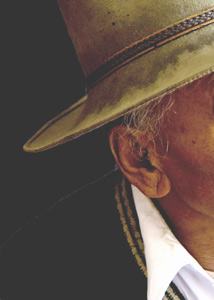Name: Phuntsok Tashi
(Alias: Yes)
Gender: Male
Interview Age: 81
Date of Birth: 1931
Birthplace: Utsang, Tibet
Year Left Tibet: 1964
Profession: Farming
Monk/Nun: No
Political Prisoner: Yes

Interview No.: 37D
Date: 2012-05-21
Language: Tibetan
Location: Mcleod Ganj, Dharamsala, Himachal Pradesh, India
Categories: Oppression and Imprisonment
Keywords: brutality/torture, childhood memories, Chinese -- first appearance of, Chinese -- oppression under, customs/traditions, escape experiences, festivals, imprisonment, salt trade, taxes, thamzing/struggle sessions, trade, Utsang
Summary:
As a child Phuntsok Tashi spent his time playing and grazing animals. When he grew older, he engaged in farming and carried salt to Nepal to barter for rice. He says his mother was extremely compassionate and always took in travelers passing through on pilgrimages to India. He describes important festivals of Nepal when salt and sheep were traded and the custom of animal sacrifice during the festival.
Phuntsok Tashi recounts how some people suffered due to taxes and debts from loans of grain they received in times of poor harvest or heavy debts. He explains about the reformation system introduced by the 14th Dalai Lama to waive old debts accumulated over the years and to seek partnership with the rich aristocrats to build bridges.
Phuntsok Tashi says the Chinese came as early as 1948-49 to his region, first seen was a lone Chinese on horseback who asked many questions and then they gradually increased in numbers. He describes his imprisonment along with many others from the region and the various forms of torture, beating, and harassment methods used by the Chinese on the prisoners. Phuntsok Tashi was fortunate to serve as camp cook and received better treatment than many other prisoners. After his release he returned to his village, but all his family had already escaped. He soon escaped to Nepal where helped to establish houses and a school for the refugees.
Interview Team:
- Rebecca Novick (Interviewer)
- Ronny Novick (Videographer)
- Thupten Kelsang Dakpa (Interpreter)

